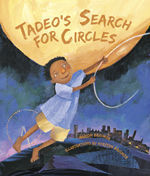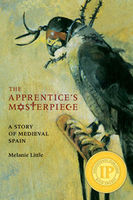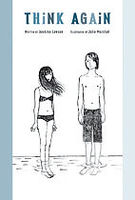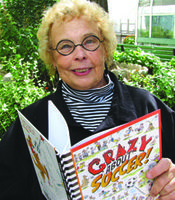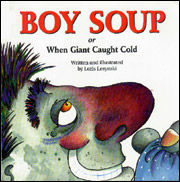Kid Lit Can, with Susan Hughes: Do I Have To Trick You Into Reading This?
Why the title? Confession: I love poetry, but I worry about it. I worry that people don't want to know about it, or read it. I worry that published Canadian poetry for kids is on the decline.
Sure, poetry for all ages suffers from a small readership, in Canada or any country, but I have this sense that kids' poetry books had a heyday in Canada — maybe 30 or 40 years ago, when Dennis Lee's Alligator Pie was first published — and since then have declined in number.
Probably books of poetry for kids just don't generate the sales necessary to make them viable. But why is that? Why don't we buy Canadian poetry for our kids to read?
- Is it because we think our kids don't like poetry? Are we right?
- Is it because Canadian poetry for kids isn't any good?
- Is it because we can't find any books of Canadian poetry on the store shelves?
- So what about older readers? Although publishers seem increasingly reluctant to publish poetry for younger Canadians, they do seem to be publishing a greater number of "free verse novels." What's that all about?
- If our kids don't like poetry or read it, why was Boy Soup, by Canadian poet Loris Lesynski, chosen as the 2013 TD Grade One Book Giveaway selection?
When I began asking people — publishers, former publishers, editors — to share with me their thoughts on the status of children's poetry in Canada, including answers to the questions above, I kept striking out. Most said they didn't know enough about it to be helpful. When I decided to ask contributors for a general reflection on children's poetry, I had more success.
But I couldn't help wondering: Was my failure to find experts to opine on publishing trends in Canadian poetry for kids a reflection of poor sourcing skills on my part — or was the response indicative of something more significant, perhaps the general disinterest in, and appreciation of, children's poetry in this country?
I'm keen to hear your views, whether you're an expert on the topic or not. Post a comment and share your thoughts. (You needn't register on this website to post comments, although you're welcome to and it only takes about five seconds!) You may also find it interesting to peek at this list of a sampling of poetry books by Canadians compiled by the CCBC.
Then, scroll down and read the comments of my guests: a publisher of children's books, a teacher-librarian, in-house children's book editor and a poet (yes, it's Loris Lesynski herself!).
Christie Harkin, publisher of children's books at Fitzhenry & Whiteside:
I think that there has been a trend away from traditional poetry over the past few years — not to say that there aren’t marvelous poems being published! Loris Lesynski and Helaine Becker are two authors, for example, who are putting out fabulous books of poems. Dennis Lee’s backlist is being given a new life, and he’s publishing a brand new volume of poetry next year, I believe. But I think that people need to rethink the idea of what a 'poem' is.
I am a huge fan of free verse. This is poetry that has meter and cadence and imagery, but doesn’t necessarily rhyme or have a dominant rhythm. I think it is a really strong medium for picture books because it naturally lends itself to being read aloud. Several of our recent picture books, like The Stamp Collector, Tadeo’s Search for Circles and Dog Breath are told in free verse.
Your CanLit News
Subscribe to Open Book’s newsletter to get local book events, literary content, writing tips, and more in your inbox
Free verse novels are also beautifully effective ways of telling stories. They are rich in imagery while having the added bonus of being deceptively approachable — the phrases tend to be broken up into bite-sized lines. For a reluctant or struggling reader who might be intimidated by a huge page of dense text, free verse novels can be visually inviting.
I’ve found, however, that the success of edgy free-verse novels (like Crank by Ellen Hopkins — which I did like) has given the free-verse novel a bit of a reputation for being too mature and harsh. I find myself having to reassure parents and teachers that not all free-verse novels are like that: Yellow Mini and Counting Back from Nine, for example, are thoughtful, beautiful character pieces that are appropriate for all teens — including boys.
Paula Goepfert, a teacher-librarian in York Region and author of numerous language arts and literacy resources:
I haven’t seen any new, exciting children’s poetry in a long time. Probably I shouldn’t be surprised. Poetry is not universally taught the way it once was. I have a ton of poetry books in my library, over a hundred. They are rarely used. A few years ago, a grade 8 teacher at my school taught a great poetry unit each year and I bought deeply for him, but there wasn't much Canadian poetry in the mix. He's gone and I haven't been asked since.
I doubt the home market is more robust. How can four perfect lines compete with the sprawling excess and violence of Harry Potter or The Hunger Games? The novels are fabulously entertaining, but good poetry requires an investment of self and a beat before it hits home.
Recent publications of Canadian poems for young people have been a huge disappointment to me. I won’t name names, but compared to Roger McGough, Jack Prelutsky, Nikki Giovanni, Dennis Lee, John Ciardi, David McCord, Langston Hughes, they offer dreadful, superficial stuff with forced rhymes and faltering rhythm. One problem may be that poetry is more personal than fiction. In many poems, I can feel the Canadian-ness, the American-ness, the British-ness. Perhaps poetry, in our globalized world, doesn’t have the legs that fiction does and that makes it less attractive to publish... and the audience dwindles.
All of that speaks mostly to what younger readers are missing. Older, school-aged readers have the genre of the poetic novel to give them a glimpse of the spare perfect punch of poetry. I’ve admired several recent works in the tradition of Hesse’s Out of the Dust. Katherine Applegate’s Home of the Brave is original and affecting. Canadians Alma Fullerton and Melanie Little have given us two brilliant works in this poetry/novel genre, Libertad and The Apprentice’s Masterpiece, respectively.
But the gap is there! Please let me know if you hit on some new poetry that I can share with kids, something that gives them the shock of delight at being understood and laid bare by words wondrously wielded.
Karen Li, senior editor at Kids Can Press:
We do not have a dedicated poetry program at Kids Can, but I can say that we are certainly open to publishing poetry when we come across something special. For example, we've published several works by Robert Heidbreder (most recently, Noisy Poems for a Busy Day), and we had the pleasure of publishing a recent collection by JonArno Lawson (Think Again).
And I think in terms of children's books, the public is quite receptive to poetry. Kids and language-play naturally go hand-in-hand. And I'd bet that most adults (who of course make the purchasing decisions for children) wouldn't think twice about picking up a book of poetry for children — even if they never read the stuff themselves. Which is, of course, their loss.
Loris Lesynski, well-known Canadian poet, author, and illustrator:
I can't offer my opinions on how children's poetry is doing in Canada, because I don't know the insides of the trade. There are wonderful rhyming writers in this country, really beautiful, funny, kid-centered poems. I read children's books and poems all the time, but don't always evaluate where they came from, how well they're selling or what they mean in the scheme or trends.
Kids love good poems and rhyming verse. Especially boys — my theory: once you give them KER-, the first line of a couplet, you've got their attention until you finish, with the -PLOP. You set up expectation, and that holds their attention. After you've been writing this kind of stuff for a long time, you feel like you're putting together an orchestra — exploring all kinds of different rhythms, playing with alliteration, sound effects, slant rhymes and — one of the most overlooked tools in group recitation — pauses. If it was up to me, I'd start each morning in the classroom with some echo reading like this.
Just about everything I've had published has been in rhyming verse. I dunno why. I know that I love rhythm and beat. It cools me down, it cheers me up.
I like poems with stories in them, even if they're pebble-sized. They might be silly and funny, but not nonsense. Nonsense is, to my mind, usually about polka-dotted snaffle-pusses and that sort of thing and not my style.
Getting a good poem or rhyming story to the finish line is usually a huge amount of work, no matter how light and fluffy the final outcome might sound. But it's fantastic when it finally works — surprise the kids, engage them, reward them with what happens and what language is uses to do so
Susan Hughes is an award-winning author of children's books — both fiction and non-fiction — including The Island Horse, Off to Class, Case Closed?, No Girls Allowed and Earth to Audrey. She is also an editor, journalist and manuscript evaluator. Susan lives in Toronto. Visit her website, www.susanhughes.ca.

